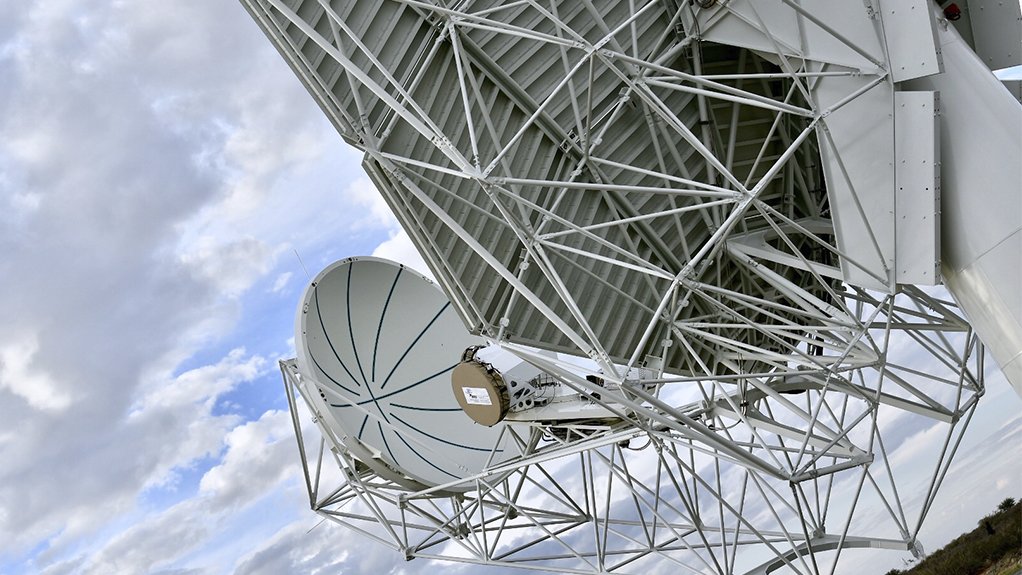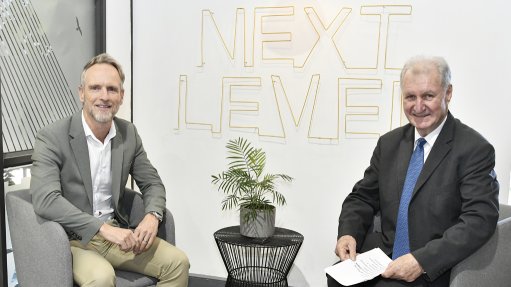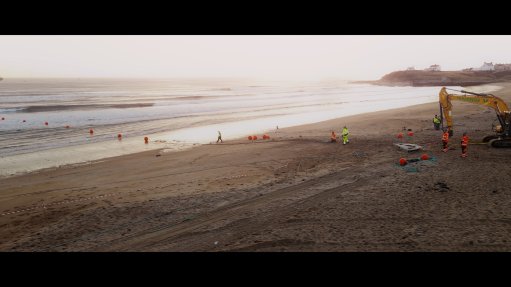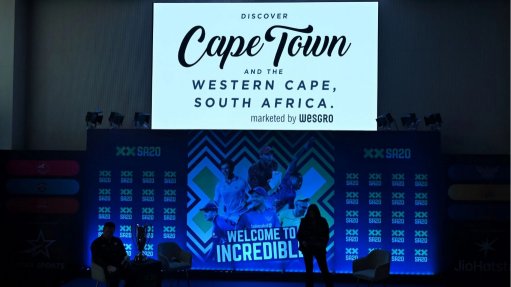MeerKAT telescope project, South Africa – update
Name of the Project
MeerKAT telescope project.
Location
Northern Cape, South Africa.
Project Owner/s
The Square Kilometre Array South Africa (SKA SA) is the agency that drove South Africa’s bid to host the €1.5-billion international SKA radio telescope and the MeerKAT programme.
Project Description
South Africa’s MeerKAT radio telescope array is intended to be a precursor of the international SKA radio telescope. The MeerKAT evolved from the original idea of a Karoo Array Telescope.
The reference design specification for the full MeerKAT is 64 offset dishes, each with a diameter of 13.5 m, with single-pixel wideband feeds covering the 500 MHz to 2.5 GHz frequency range. The design means that there are no struts over the dish, which can reduce or scatter incoming radio waves, thus increasing the sensitivity of the antenna.
The completed MeerKAT will have a central core, but some dishes are almost 10 km apart, thus replicating the SKA on a small scale.
It will also facilitate the installation of multiple receiver systems in the primary and secondary focal areas and is the reference design for the midband SKA concept.
The MeerKAT will be delivered in three phases.
The first phase – the MeerKAT Precursor Array, known as KAT-7 and which comprises seven 12-m-diameter composite parabolic dishes at the Karoo site – was completed in 2010.
This prototype interferometer array serves as an engineering test-bed for technologies and systems, and as an operational radio telescope. MeerKAT is designed to be integrated into the SKA radio telescope, which will be cohosted by South Africa and Australia.
Potential Job Creation
The project has created about 7 284 employment opportunities to date.
Capital Expenditure
The estimated cost is R900-million.
Planned Start/End Date
The project was inaugurated in July 2018.
Latest Developments
South African contractor Concor, in partnership with OptiPower, has been awarded a R212-million contract for the structural foundations and associated infrastructure for 24 additional dishes for the MeerKAT.
The partners have also been contracted to design another 109 dish foundations and associated infrastructure. The project is currently in the design stage, with construction due to start in June.
Concor will be responsible for the structural concrete foundations for the 24 new dishes and the construction of 40 km of gravel access roads and four gatehouses. The company will also have to erect a construction camp capable of accommodating about 250 people, complete with security fencing, water storage, sewage and wastewater treatment facilities and settling ponds.
OptiPower will electrify the works and provide fibre connectivity for the new dish sites. This will involve about 60 km of trenching, along with the required electrical power cables, fibre cables and fibre ducting.
“A key constraint of this current project is the need to limit any radio frequency interference (RFI) in the vicinity of the MeerKAT telescope array,” Concor contracts director Joe Nell notes. “This is because of the highly sensitive nature of the radio telescope equipment, which is designed to detect extremely weak radio signals from astrophysical sources.”
RFI signals are emitted by cellphones, vehicle equipment and domestic appliances such as microwave ovens. These can cause interference with the reception of weak radio waves from far distant galaxies and other astronomical and astrophysical phenomena. In extreme cases, they could also damage the array’s dish antennas.
As a consequence, the construction camp will be located about 15 km away from the MeerKAT instrument. Concor’s main construction office will be established at Carnarvon, the nearest town to the MeerKAT, about 100 km from the radio telescope. As the time approaches to start the work, an insulated RFI container will be erected at the site, which will enable the contractors to not only communicate but also operate some electronic equipment without interfering with the telescope.
Every vehicle and piece of equipment used by the partner companies will have to be checked for RFI emissions and certified, before being allowed on site.
“We have employed an RFI expert to test our equipment and submit the necessary data to the client. After careful analysis of this data, we will be granted a permit for that particular item of machinery or advised what steps need to be taken before machinery can be passed for use on site,” Concor site agent Roy van Leeve has said.
The contractor will use small, medium-sized and microenterprises located in the local municipal area of Kareeberg. This includes the towns of Brandvlei, Loxton, Vanwyksvlei and Williston, as well as Carnarvon.
Key Contracts, Suppliers and Consultants
Group Five Coastal (building foundations); Schneider Electric South Africa (building management system); Stratosat Datacom (part of Germany’s Schauenburg Group), with its technology partners, General Dynamics Satcom, of the US, and Vertex Antennentechnik, of Germany (design, construction, installation and commissioning of antennas); Efficient Engineering (antenna pedestals and yokes); Tricom Structures (backup structures for dishes); Titanus Slew Rings (main azimuth bearings); National Research Council of Canada (low-noise amplifiers); Oxford Cryosystems (cryogenic cooling system); Brink & Heath Civils (foundations); Max-Planck-Society and Max Planck Institute for Radio Astronomy (S-band radio-wave receivers) and Concor, in partnership with OptiPower (structural foundations and associated infrastructure for 24 additional dishes).
Contact Details for Project Information
MeerKAT engineering office, tel +27 21 506 7300 or fax +27 21 506 7375.
Article Enquiry
Email Article
Save Article
To advertise email advertising@creamermedia.co.za or click here
Comments
Announcements
What's On
Subscribe to improve your user experience...
Option 1 (equivalent of R125 a month):
Receive a weekly copy of Creamer Media's Engineering News & Mining Weekly magazine
(print copy for those in South Africa and e-magazine for those outside of South Africa)
Receive daily email newsletters
Access to full search results
Access archive of magazine back copies
Access to Projects in Progress
Access to ONE Research Report of your choice in PDF format
Option 2 (equivalent of R375 a month):
All benefits from Option 1
PLUS
Access to Creamer Media's Research Channel Africa for ALL Research Reports, in PDF format, on various industrial and mining sectors
including Electricity; Water; Energy Transition; Hydrogen; Roads, Rail and Ports; Coal; Gold; Platinum; Battery Metals; etc.
Already a subscriber?
Forgotten your password?
Receive weekly copy of Creamer Media's Engineering News & Mining Weekly magazine (print copy for those in South Africa and e-magazine for those outside of South Africa)
➕
Recieve daily email newsletters
➕
Access to full search results
➕
Access archive of magazine back copies
➕
Access to Projects in Progress
➕
Access to ONE Research Report of your choice in PDF format
RESEARCH CHANNEL AFRICA
R4500 (equivalent of R375 a month)
SUBSCRIBEAll benefits from Option 1
➕
Access to Creamer Media's Research Channel Africa for ALL Research Reports on various industrial and mining sectors, in PDF format, including on:
Electricity
➕
Water
➕
Energy Transition
➕
Hydrogen
➕
Roads, Rail and Ports
➕
Coal
➕
Gold
➕
Platinum
➕
Battery Metals
➕
etc.
Receive all benefits from Option 1 or Option 2 delivered to numerous people at your company
➕
Multiple User names and Passwords for simultaneous log-ins
➕
Intranet integration access to all in your organisation




















